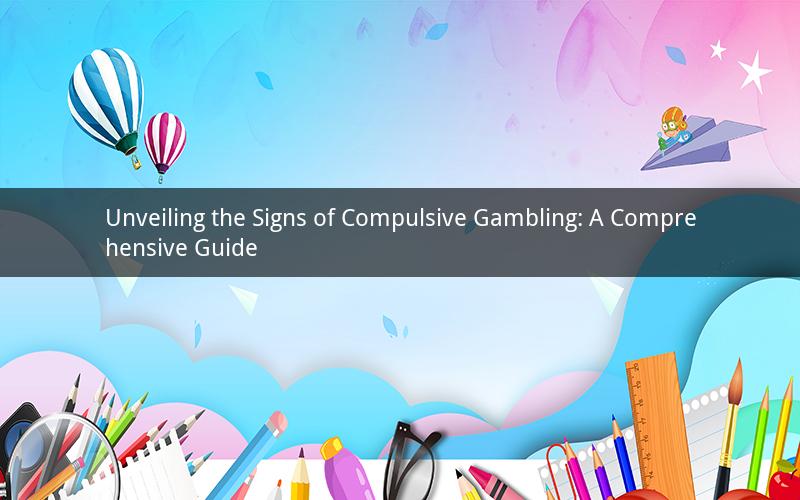
Introduction:
Compulsive gambling, also known as problem gambling, is a serious condition that affects individuals from all walks of life. Identifying whether you or someone you know is a compulsive gambler can be challenging, as it often goes unnoticed until it reaches a critical point. In this article, we will explore the signs and symptoms of compulsive gambling and provide you with a comprehensive guide on how to determine if you are a compulsive gambler.
1. Understanding Compulsive Gambling:
Compulsive gambling is characterized by an uncontrollable urge to gamble, despite the negative consequences it may have on one's life. It is a type of addictive behavior that can lead to financial, emotional, and social problems. To identify if you are a compulsive gambler, it is essential to understand the key characteristics of this condition.
1.1 Uncontrollable Urge:
One of the primary signs of compulsive gambling is an overwhelming urge to gamble, even when you know it is causing harm. This urge can be difficult to control and may lead to impulsive decisions to gamble, regardless of the circumstances.
1.2 Repeated Attempts to Stop:
If you have made repeated attempts to stop gambling but have been unsuccessful, it may indicate a compulsive gambling problem. These efforts to quit often involve setting limits, taking breaks, or seeking help, but the urge to gamble persists.
1.3 Loss of Control:
Compulsive gamblers often find it challenging to control the amount of money they spend or the time they spend gambling. They may continue to gamble even when they are losing money or when they have promised themselves to stop.
1.4 Emotional and Psychological Consequences:
Compulsive gambling can have severe emotional and psychological consequences. It can lead to feelings of guilt, shame, anxiety, and depression. Relationships, work, and other responsibilities may suffer as a result of the gambling problem.
2. Recognizing the Signs:
Identifying the signs of compulsive gambling can be crucial in seeking help and taking steps towards recovery. Here are some common signs to look out for:
2.1 Preoccupation with Gambling:
Do you find yourself constantly thinking about gambling, even when you are not engaging in it? Do you dream about winning big or planning your next gambling session?
2.2 Increased Risky Behavior:
Are you taking greater risks in your gambling activities, such as betting more money or playing for longer periods of time? Do you feel the need to increase the stakes to achieve the same level of excitement?
2.3 Neglecting Responsibilities:
Is your gambling causing you to neglect your responsibilities at work, home, or school? Are you missing deadlines, skipping classes, or ignoring important commitments?
2.4 Financial Struggles:
Are you experiencing financial difficulties as a result of your gambling? Do you find yourself borrowing money, selling personal belongings, or taking out loans to fund your gambling habits?
2.5 Emotional and Psychological Distress:
Do you experience feelings of guilt, anxiety, or depression due to your gambling? Are you hiding your gambling activities from loved ones or feeling ashamed of your behavior?
3. Seeking Help:
If you suspect that you or someone you know is a compulsive gambler, it is crucial to seek help. Here are some steps you can take:
3.1 Professional Help:
Consulting a mental health professional, such as a therapist or counselor, can provide you with the necessary support and guidance. They can help you understand your gambling behavior and develop strategies to overcome it.
3.2 Support Groups:
Joining a support group, such as Gamblers Anonymous, can provide you with a sense of community and understanding. Sharing your experiences with others who have faced similar challenges can be incredibly beneficial.
3.3 Financial Counseling:
If your gambling has caused financial difficulties, seeking the help of a financial counselor can assist you in managing your finances and developing a budget.
3.4 Setting Boundaries:
Establishing clear boundaries and limits around your gambling activities can help prevent relapse. Set specific rules, such as limiting the amount of money you spend or the time you spend gambling.
Frequently Asked Questions:
1. Q: Can compulsive gambling be cured?
A: Compulsive gambling is a chronic condition, but it can be effectively managed with proper treatment and support. Recovery is a gradual process that requires commitment and ongoing effort.
2. Q: Is compulsive gambling a form of addiction?
A: Yes, compulsive gambling is considered a form of addiction. It shares many similarities with other addictive behaviors, such as alcohol or drug addiction.
3. Q: Can someone recover from compulsive gambling on their own?
A: While some individuals may find success in managing their gambling problem independently, seeking professional help and joining support groups can significantly increase the chances of successful recovery.
4. Q: How long does it take to recover from compulsive gambling?
A: The duration of recovery from compulsive gambling varies from person to person. Some individuals may experience immediate relief, while others may require ongoing treatment and support for several years.
5. Q: Can compulsive gambling affect my family and friends?
A: Yes, compulsive gambling can have a significant impact on family and friends. It can strain relationships, cause financial stress, and lead to emotional distress. Seeking help for both the gambler and their loved ones is crucial for healing and rebuilding trust.